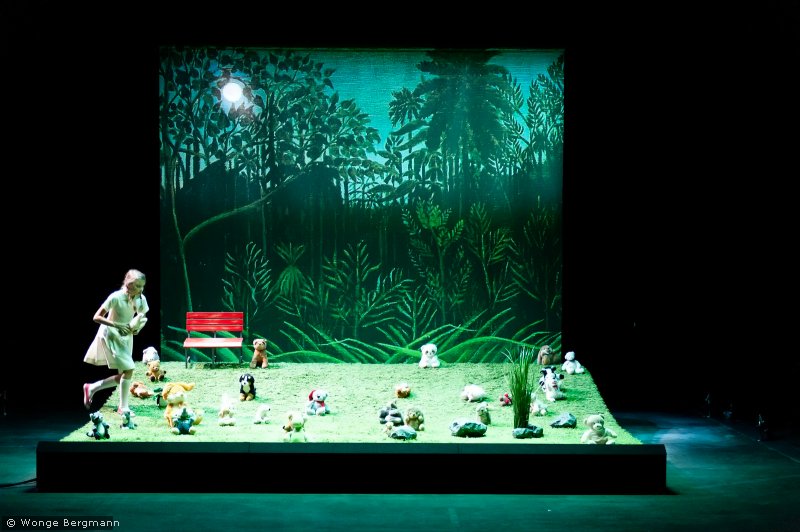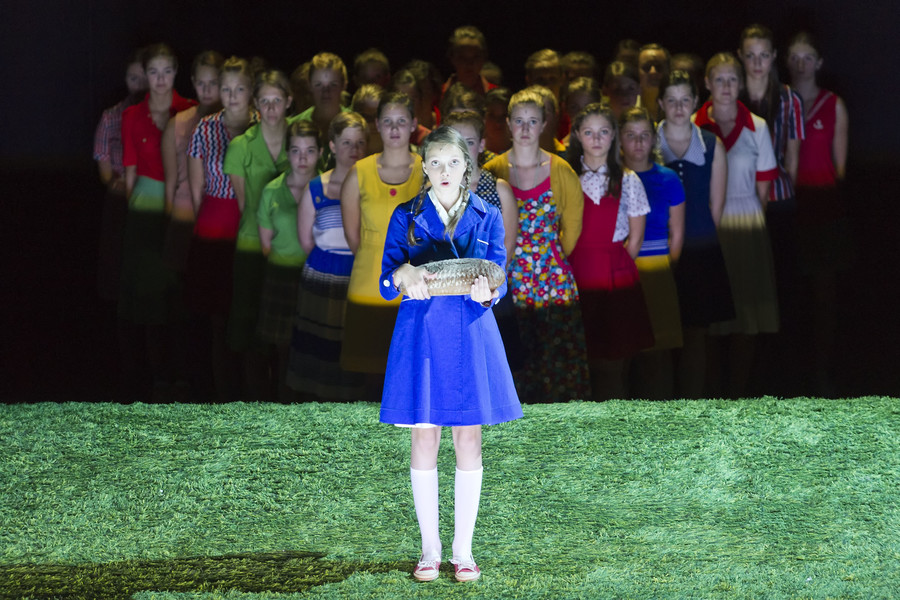Events
Heiner Goebbels and Carmina SlovenicaWhen the mountain changed it’s clothing
Heiner Goebbles
Vocal Theatre Carmina Slovenica Artistic director:Karmina Šilec
Stage and Light design:Klaus Grűnberg
Costumes:Florence von Gerkan
Dramaturgy:Matthias Mohr
Sound design:Willi Bopp
Vocal Theatre Carmina SlovenicaAmbrož Maja, Arnejčič Ana, Arnejčič Iva, Bočnik Špela, Bočnik Tamara, Borec Saša, Borko Mojca, Borkovič Neža, Breznik Barbara, Brvar Špela, Črnčič Jasmina, Dvornik Danaja, Germ Eva, Gostenčnik Anja, Gostenčnik Staša, Gril Rogina Kaja, Habjanič Sintija, Hanžič Nina, Karlovčec Nastja Anastazija, Knehtl Špela, Kralj Nika, Lačen Alja, Lavrenčič Alenka, Lazar Petra, Novak Ana, Pečovnik Nika, Pušenjak Nina, Reljič Aina, Ritonija Sara, Sandrin Ana, Stojkovič Melanija, Studen Ana, Šimek Barbara, Topolovec Jera, Vasle Neža, Vinkovič Anja, Zidarič Mojca, Žnidar Anja
Texts:Jean-Jaques Rousseau, Jeseph Eichendorff, Adalbart Stifter, Gertrude Stein, Alain Robbe-Grillet, Marlen Haushofer, Marina Abramović and Iam McEwan
Music: Johannes Brahms, Anrold Schönberg, Karmina Šilec, Sarah Hopkins and Heiner Goebbles
Steirischer Herbst (AT), Maribor Theatre Festival (SI), Festival Borštnikovo srečanje in the context of Maribor 2012 European Capital of Culture (SI), Théâtre de la Ville-Paris & Festival D'Automne, Paris (FR), Grand Theatre, Luxemburg (LU), Kunstfestspiele Herrenhausen (DE) Holland Festival, Amsterdam (NL) and Kunstenfestivaldesarts, Brussels (BE).
Kindly supported by the association of friends and sponsors of the Ruhrtriennale.Music theatre by Heiner Goebbels with Carmina Slovenica
When the mountain changed its clothing explores the changes experienced by the 40 girls from Maribor, ages ten to twenty. They confront us with stories and questions about the end of childhood.the old is no more, yet the new remains out of reach. On this threshold, they assemble to play seemingly harmless games, verses, songs, and create poetic threatening imaes. In a mutual interplay of sovereignty and repression, the young singers move through the cycle of the seasons, constantly calibrating the balance of power relations among one another and especially between the audience and the stage.
„What do young girls dream of” – „Of the knife and of blood.”
In 1995, this fragment of dialog by French writer Alain Robbe-Grillet closed an early musical theatre work by Heiner Goebbels, Die Wiederholung (The Repetition). It now represents the point of departure for his latest work of music theatre. Together with the singers and his artistic team, Heiner Goebbels developed a scenario in which the girls constantly sway between a cliche of childish innoicence and unpredictability. These highly charded images also emerge from the unbelievable energy of the young protagonists and reflect a social transformation: the rapid political and social changes in the region of this chorus and their musical culture.
Under the musical direction of Karmina Šilec, the Slovenian chorus has developed an international reputation. With its large repertoire, stretchung from medieaval to folk works and contemporary music, they perform around the world. Vocal Theatre Carmina Slovenica not only impresses with their great musical and choreographic precision, but also due to the self-confidence of the young singers.
The music to When the mountain changed its clothing combines choral music from Carmina Slovenica’s repertoire with partisam songs from the Tito era and popular music.
Heiner Goebbels
German composer and director, born 1952, living since 1972 in Frankfurt/Main. Graduated in sociology and in music he creates music theatre, staged concerts, radio works, compositions for ensemble and for big orchestra. As a composer he collaborates with the finest ensembles and orchestras (Ensemble Modern, London Sinfonietta, Orchestra in the Age of Enlightenment, Berlin Philharmonics) and conductors (Lothar Zagrosek, Sir Simon Rattle, Peter Eötvös, Peter Rundel and many others).
Since the beginning of the 90ties he composed and directed unique and celebrated music theatre works such as Black on White (1996), Max Black (1998), Eislermaterial (1998), Hashirigaki (2000),Landscape with distant relatives (2002), Eraritjaritjaka (2004), Stifters Dinge (2007), Songs of Wars I have seen (2007), I went to the house but did not enter (2008) among many others, which mostly have been produced by Theatre Vidy, Lausanne and have been invited to the most important international theatre and music festivals in Europe, the US, South America, Australia and Asia.
Many CD releases with ecm-records for which he recieved two grammy nominations; writings, lectures. He recieved many international record-, radio-, theatre- and music-awards. Composer in residence at the Lucerne Festival and for the Bochum Symphonics, member of several academies of arts, honorable fellow at Dartington College of Arts and at the Central School of Speech and Drama, London; fellow at the Institute of Advanced Studies, Berlin (2007/08) and artist in residence at Cornell University, Ithaca USA.
Heiner Goebbels is professor at the Institute for Applied Theatre Studies of the Justus-Liebig-Universität Gießen and since 2006 President of the Theatre Academy of Hesse. From 2012 until 2014 he is artistic director for the International Festival of the Arts Ruhrtriennale.
In 2012 Heiner Goebbels is winner of the International Ibsen Award, one of the world’s most prestigious theatre prizes.
The vocal ensemble Carmina Slovenica with its artistic director Karmina Šilec is noted for its innovative programming which explores works from the forefronts of the contemporary music scene. With »Choregie – vocal theatre or theatre of voices« Carmina Slovenica is introducing a concept which incorporates contemporary music, drama, movement and other stage elements.
With this concept of vocal theatre the ensemble performed on stages worldwide – from Tokyo Metropolitan Art Space to the Teresa Carreno Theatre in Caracas, from Hong Kong Cultural Centre to Teatro Colon in Buenos Aires. Carmina Slovenica has been invited to music events of the highest esteem such as the World Music Days (organized by the ISCM), Moscow Easter Festival, Dresdner Musikfestspiele, the World Symposium on Choral Music (organized by the IFCM), the European Symposium on Choral Music (IFCM), Polyfollia, America Cantat, Choir Olympics, Europa Cantat etc.
Many productions have been awarded on different occasions, lately in 2008, when Karmina Šilec received an award from the International Theatre Institute “Music Theatre Now” in the category Music beyond opera.
The main aim of the ensemble and its artistic director is a continual search for new music and new fields of work which has already shown results in a wide repertoire it has today; from early and ethnic vocal music to the latest avant-garde. The choir with its characteristic sound and wide-ranged virtuosity is the ideal ensemble for different repertoires – from a cappella music of all genres to vocal instrumental projects.
Concert tours in almost all countries of Europe, the USA, Canada, Africa, Central and South America, Japan and China, many highest awards at international choral competitions, participation in many international projects, recordings made for many radio and television stations, 15 CDs and 1 LP produced, excellent reviews of the ensemble’s performances by musical experts and critics … all these achievements speak for themselves and confirm the choir’s highest reputation.
Karmina Šilec has brought freshness and originality to the world of vocal music, opening new spaces of expression, persuasiveness, intensity of experience, and communication. With “Choregie – vocal theatre” and its innovative interventions, she has opened wider artistic spaces and set trends towards complex multi-media events – productions performed on stages of international festivals and broadcast by the EBU and Eurovision.
As conductor she has projects with various ensembles: Carmina Slovenica Choir, the Radio Slovenia Symphony Orchestra, the Slovenian National Opera and ballet Maribor, the Slovenian National Project Choir, ensemble !Kebataola!, Orchestra Chorus Instrumentalis and many ensembles worldwide.
Karmina Šilec has received more than 20 of the highest and different special awards on International competitions, just to name some: she was awarded with the international Robert Edler Prize for Choral Music, received the Prešeren Fund award for the project “Vampirabile” and most recently an award by the ITI – International Theatre Institute “Music Theatre Now” in the category Music beyond opera.
She also works as an artistic adviser for choral music, gives lectures to conductors and is regularly a guest conductor, jury member or member of artistic committees at festivals and competitions. She teaches conducting at the University of Maribor and lectures at many universities around the world.
Karmina Šilec is the artistic director of Choregie – New Music Theatre, the international project Attacca, the Choregie aka Choregie festival for new music and the concert series Attacca. There are few artistic teams in Slovenia as widely recognizes in the international arena as can undoubtedly be said for the conductor Karmina Šilec’s outstanding ensemble Carmina Slovenica and !Kebataola!, together with the movements she created.

